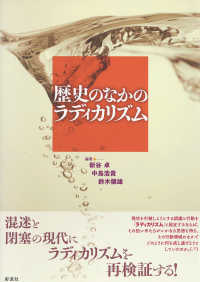- ホーム
- > 洋書
- > 英文書
- > Philosophy
基本説明
In addition to providing a general overview of the main thinkers of post-Idealist German aesthetics, the book explores the relationship between tradition and modernity. For despite the differences that distinguish one philosopher's end of art from another's, all authors treated here turn the end of art into an occasion to thematize and to reflect on the very thing that modernism cannot or should not be: tradition.
Full Description
Since Hegel, the idea of an end of art has become a staple of aesthetic theory. This book analyzes its role and its rhetoric in Hegel, Nietzsche, Benjamin, Adorno, and Heidegger in order to account for the topic's enduring persistence. In addition to providing a general overview of the main thinkers of post-Idealist German aesthetics, the book explores the relationship between tradition and modernity. For despite the differences that distinguish one philosopher's end of art from another's, all authors treated here turn the end of art into an occasion to thematize and to reflect on the very thing that modernism cannot or should not be: tradition. As a discourse, the end of art is one of our modern traditions.
Contents
@fmct:Contents @toc2:1 Introduction: The End in the Meantime 000 2 Hegel without End 000 3 Nietzsche's Backward Motion 000 4 Counter Play: Benjamin 000 5 Endgame: Adorno 000 6 The Same End and the Other Beginning: Heidegger 000 7 That Mysterious Yearning toward the Chasm 000




